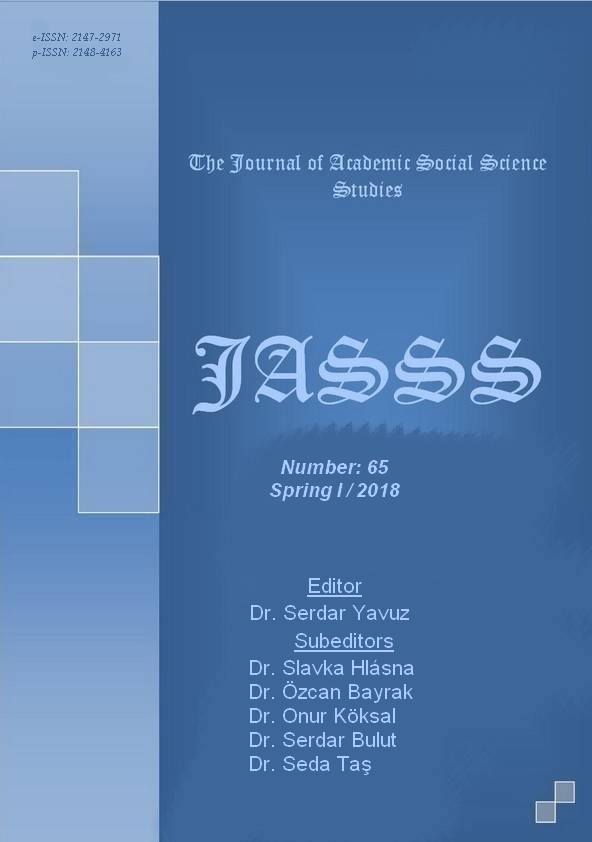Author :
Abstract
Oyun çeşitli kaynaklarda “ iyi vakit geçirmeye yarayan eğlence” olarak tanımlanmaktadır. Ancak yapılan araştırmalarda oyunun, çocuğun fiziksel, duygusal, bilişsel ve sosyal yönden gelişimini desteklediği belirlenmiştir. Bu düşünceden hareketle oyun öğrenme-öğretme etkinlikleri içerisinde eğitim sistemimizde yer almıştır. Bu araştırmada ilkokulda eğitsel oyunlar tekniğinin öğretimde kullanılmasına ilişkin öğretmen görüşlerinin incelenmesi amaçlanmıştır. İlkokul öğretmenlerinin eğitsel oyun tekniklerini derslerde kullanma durumları, hangi amaçlarla kullandıkları, oyun seçiminde nelere dikkat ettikleri, hangi tür oyunlara daha çok yer verdikleri nitel araştırma yöntemlerinden olgubilim deseni ile incelenmeye çalışılmıştır. Araştırma 2016-2017 eğitim-öğretim yılında Ankara İli, Nallıhan İlçesinde gerçekleştirilmiştir. Çalışma gurubunu amaçlı örnekleme yöntemlerinden kolay ulaşılabilir durum örneklemesi yöntemi ile ulaşılabilen ilkokulda görevli 10 sınıf öğretmeni oluşturmaktadır. Nitel olarak tasarlanan araştırmada verilerin toplanması için yapılandırılmış görüşme tekniğinden yararlanılmıştır. Araştırmadan elde edilen sonuçlar; öğretmenlerin eğitsel oyunları derslerde aktif olarak kullanmaya çalıştıklarını, oyunla çocuğun derse aktif katıldığını, yaparak yaşayarak öğrendiklerini, kalıcı öğrenme sağlandığını ve derslerin eğlenceli hale geldiğini düşündüklerini, tercih etmelerindeki amaçlarının derse katılımı arttırmak, davranış kazandırmak ve kazanılan davranışı pekiştirmek, sosyalleşme, hoşgörü, hakkını arama, iletişim, sorumluluk gibi yetenekleri geliştirmek olduğunu ortaya koymuştur. Eğitsel oyunları tercih ederken seviye ve konuya uygunluğa, zaman ekonomisine, eğitici ve eğlendirici olmasına dikkat ettikleri görülmüştür. En çok dikkat geliştirici, stratejik oyunlar, kelime oyunları, evcilik, geleneksel çocuk oyunlarını tercih ettikleri ve değerlendirmede sorun yaşamadıkları belirlenmiştir.
Keywords
Abstract
In various literature, games are accepted as an entertainment that help people tospend good time. However, there searches proved that games contribute children toim prove their physical, emotional, cognitive and social development. In this context, games are included into the curriculum as a part of learning and teaching activities. In this research, it is aimed toinvestigatetheideas of teachers towards theuse of educational game techniques in teaching at primary schools. It is investigated how often the primary school teachers use educational games in teaching, what their purpose is, what criteria they consider while choosing the games and whatkind of games they prefer by using phenographic design which is one of the qualitative method. There search was realised in primary schools in Nallıhan, Ankara in 2016-2017 academic year. The study group consists of 10 class teachers working at state schools chosen by purpose based sampling method. Structured in teview technique was used toobtained the neccessary data. The obtained data indicated that the teachers tried to use educational games actively in their teaching. In this context the students became active in the classes, they learned by experiencing the games, the classes became more attractive, such games motivated the students to participate more, the students acquired good behavioural habits, educational games contribute to the permanent learning, the students became social, they became to lerantand they improved their interaction abilities, they became ready to take responsibilitie sand they learned how to seek their rights. While choosing the games some criteria was taken into consideration such as whether the games were relevant to their level and their curriculum, they were educational and joyful and they were time saving to teach them the desired target. There search also depicted that the teachers prefered games likes trategical games, vocabulary games, games about family relations and traditional games. Theteachers expressed that they never experienced any difficulties in evaluation of the games.





